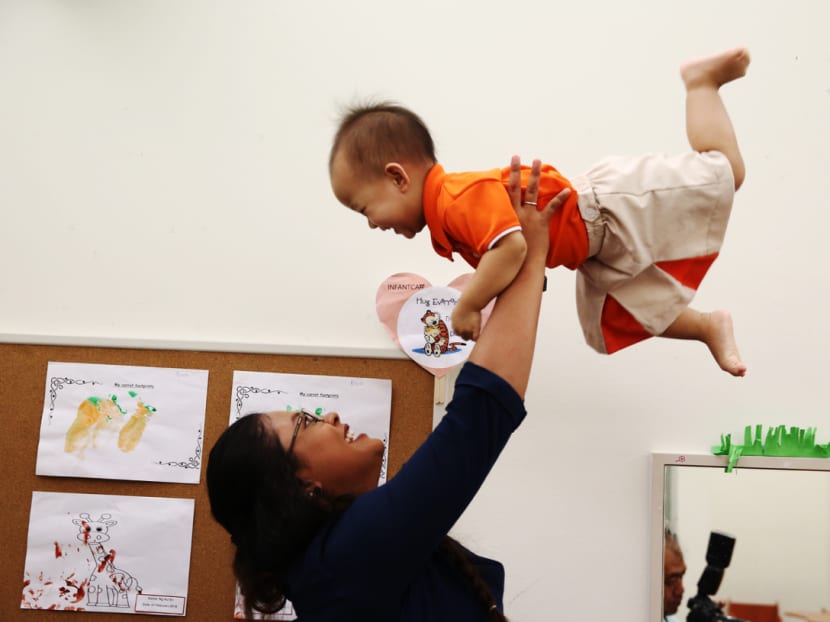Rising costs, income uncertainty a worry for younger Singaporeans: MPs
SINGAPORE — Young couples today are being “squeezed” financially as they start their own families, due to rising costs and uncertainty over income, said Member of Parliament (MP) Ong Teng Koon on Wednesday (Feb 27).

To reduce the cost burden on young couples, Member of Parliament Ong Teng Koon suggested that the Government provide more subsidies in areas such as childcare and school bus fees.
SINGAPORE — Young couples today are being “squeezed” financially as they start their own families, due to rising costs and uncertainty over income, said Member of Parliament (MP) Ong Teng Koon on Wednesday (Feb 27).
He was among several MPs who raised issues that concern younger Singaporeans on the second day of the Budget debate in Parliament. Others touched on the subject of mental health well-being and Singapore’s commitment to climate change as younger people become more environmentally conscious.
Focusing on young couples in his speech, Mr Ong, the MP for Marsiling-Yew Tee Group Representation Constituency (GRC), noted that they come under “intense financial pressure” as they have to cope with wedding expenses, buying their first marital home and starting a family.
Pointing out that companies seem to be moving towards contract and freelance work, couples face uncertainty over income, said Mr Ong, who noted that “retrenchment is also no longer a blue-moon event”.
As a result, a “rational response” would be to “delay or avoid” having children, because doing so would raise the household costs, he added. This would in turn affect the country’s total fertility rate.
It would be unfair to “dismiss their concerns as purely the result of unrealistic expectations”, said Mr Ong, who gathered this feedback from his residents.
“They lament that ‘we are university graduates but our standard of living doesn’t seem to be better than that of our non-graduate parents who could afford bigger houses and more luxuries when we were growing up’.”
To reduce the cost burden, he suggested that the Government provide more subsidies in areas such as childcare and school bus fees.
Pointing out that parents in Norway are entitled to 46 weeks’ full salary during parental leave, or 80 per cent pay for 56 weeks, Mr Ong said that the Government could increase the number of maternity leave days here to boost the total fertility rate. Right now, mothers whose children are Singaporean citizens are entitled to 16 weeks of paid maternity leave.
To help younger, low-income Singaporeans start families, Nominated MP Abbas Ali Mohamed Irshad proposed that the Government reduces the qualifying age for the Workfare Income Supplement (WIS) scheme. The scheme — which supplements the income and retirement savings of eligible workers through cash payments and Central Provident Fund (CPF) contributions — is only for those aged 35 and above.
Mr Abbas, who is the founder of inter-religious, non-profit group Roses of Peace, also suggested increasing the cash-to-CPF ratio so that such couples have more cash on hand.
VALUING MENTAL HEALTH MORE
NMP and social entrepreneur Anthea Ong told the House that there is a worrying trend of an increasing number of people suffering from mental illness.
Of greater concern is how more young Singaporeans have sought help for mental health issues, she added.
A study by the Institute of Mental Health (IMH) published last year showed there was a 190 per cent increase in the number of individuals aged 16 and 30 seeking help from its Community Health Assessment Team. The number went up from 550 in 2015 to 1,580 in 2017.
Singapore’s social policies “must place mental health as a priority for the underserved and vulnerable communities alongside basic needs”, noted Ms Ong.
“There is no health without mental health.
“We must normalise mental health and bring it out to the open. The Government and community have to learn to value mental health as a basic need and to then reduce stigma and improve help-seeking and recovery,” she said.
PROPOSAL FOR CLIMATE CHANGE ACT
Ang Mo Kio GRC MP Lim Wee Kiak said that unlike other countries such as the United Kingdom, Singapore does not have a Climate Change Act. He proposed that the Government enact such a legislation to “enshrine our commitment” to mitigate effects of climate change.
In other countries, such legislation requires the governments to set out their targets and explain how they will reduce emissions, he noted.
As younger Singaporeans become more environmentally conscious, he urged the Government to develop “more concrete” environment-friendly measures such as providing incentives to private property owners to install solar panels and increasing education outreach efforts.
HELPING YOUNG START-UPS
Fengshan MP Cheryl Chan said that as baby boomers retire from the workforce over the next two decades, millennials will form a large base of workers here and there is a need to “step up mentorship guidance and cross-industry functional knowledge exchanges”.
“This drain of expertise and knowledge will have its repercussions if there are no early channels for inter-generation or inter-workplace transfer,” she added.
To reduce the learning curve for young start-ups and small- and medium-sized enterprises as they scale up or expand overseas, Ms Chan suggested setting up a working group comprising experienced mentors who can give these firms guidance.









